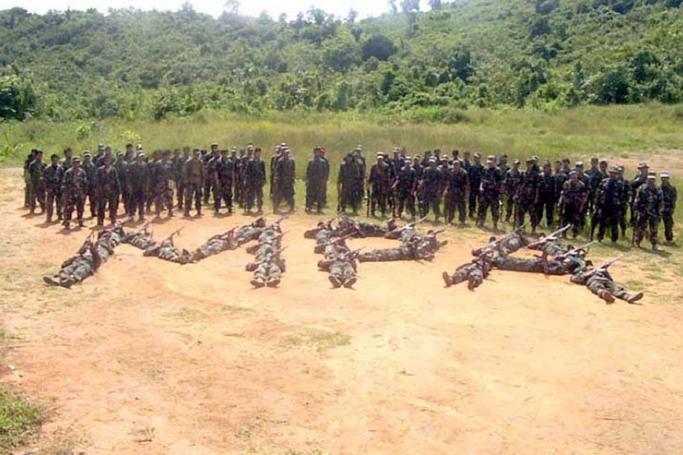Separatist rebels ambushed a convoy of Indian troops in the country's northeastern state of Manipur on Thursday, killing 20 soldiers. Twelve other soldiers were injured, some of them seriously.
Military officials told Mizzima News that a platoon from the 6th Dogra Regiment was out on a road opening patrol when they came under fire between Paralong and Charong village around 8.30am Indian time.
The rebels fired rocket-propelled grenades and from assailt rifles and machine guns from both sides of a hilly road after stopping the convoy with an explosion.
Two vehicles carrying the troops on Tengnoupal-New Samtal road in Manipur's Chandel district went up in flames when hit by the RPGs.
17 soldiers died on the spot , three on way to hospital, officials said.
Most of the bodies were charred in the flaming vehicles.
But military spokesman Lt Colonel Ajay Kumar Sharma said the rest of the troops fought back and engaged the rebels in a fierce encounter for nearly three hours.
An insurgent was also killed but was carried away by the raiders.
Later reinforcements arrived from nearby military camps and the rebels fled.
This is one of the worst attack on the Indian army in the country's northeast, perhaps the most deadly in recent decades.
The Khaplang faction of the Nationalist Socialist Council of Nagaland (NSCN) has claimed responsbility for the attack and said two Manipuri groups, KYKL and KCP, helped it in pulling it off.
Intelligence officials said about 50 KYKL, KCP and NSCN(K) insurgents, led by self-styled Lieutenant Tamba andf Captain Starson Kamkhang, pulled off the the attack.
After the attack , the raiding group is said to have moved towards for Hthanhtapin village south of Tamu in Myanmar where the KYKL is believed to have a few training camps.
The NSNC(K), with which the Centre called off a ceasefire arrangement, operates from Myanmar’s Eastern Naga Hills in Sagaing Division.
The Manipuri rebel groups and several others from India's troubled Northeast have recently joined Burmese Naga rebel leader Khaplang in forming a -platform of rebel groups called the UNLFWSEA ( United National Liberation Front of West and SouthEast Asia).
Since then, the attacks on Indian forces in Northeast have sharply increased. One killed eight troops of the para military Assam Rifles in neighbouring state of Nagaland last month.
Khaplang's faction of the once-united National Socialist Council of Nagaland (NSCN) reneged on a 14 year old ceasefire with India and kickstarted negotiations with other active rebel groups in the country's Northeast to form the ULFWSEA.
Khaplang is a Myanmarese Naga from the Hemi tribe.
Four groups have already joined them and some more might soon.
Indian intelligence says it suspects the involvement of the NSCN (Khaplang faction) with a seperatist group of Manipur in pulling off Thursday's ambush.
Khaplang however maintains a ceasefire with the Myanmar army he signed in 2012.
India says Khaplang is sheltering atleast seven rebel groups from India's Northeast in his bases in Myanmar's thickly forested Sagaing Region bordering India.
It has requested Myanmar to disarm and push out these rebels as India's other eastern neighbours Bhutan and Bangladesh has done in recent years.
But Myanmar says the terrain in Sagaing is treacherous and its troops are busy fighting other rebel groups like the Kachin Independence Army (KIA) and the Kokang rebel group MNDAA on the borders with China.
The spurt in rebel activities follows the breakdown of ceasefire between Delhi and the NSCN's Khaplang faction.
India's Northeast has been home of dozens of insurgent groups, some fighting for independence, others for greater autonomy and still some for separate states within India.
In Delhi, minister of state for home Kiren Rijiju announced the Centre will not enter into peace talks with any emerging militant outfits in the northeast as the Narendra Modi government decided to take a “tough line” against the insurgents.
He also said the contentious Armed Forces Special Powers Act (Afspa) will stay on in the north-eastern states other than Tripura where the law was repealed on May 27 by the state government after 18 years.
Prime Minister Narendra Modi termed the attack 'mindless'.












